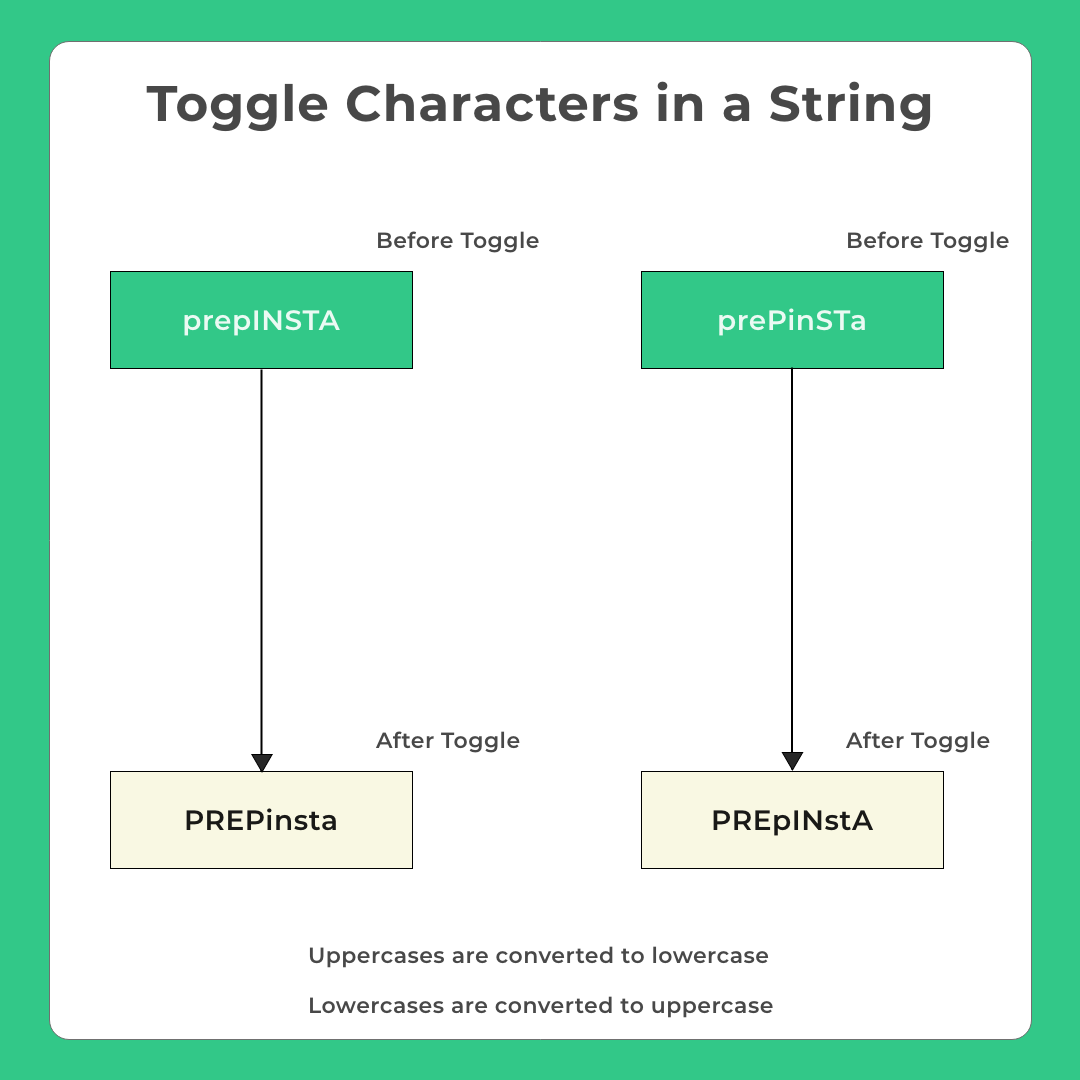C Program to Toggle Each Character in a String
Toggle each character in a string.
In this article we will learn a C program to toggle each characters in a string i.e. to convert upper case characters to lower case characters and lower case characters to upper case characters in a string. This will help us to understand character conversion using ASCII values.

Methods Discussed
- Method 1: Using ASCII but adding/subtracting numbers to lowercase/uppercase
- Method 2: Using ASCII and directly adding/subtracting characters
- Method 3: Using while loop instead of a for loop
- Method 4: Using recursion

Algorithm:
- Initialize the variables.
- Accept the input.
- Initiate a for loop.
- Toggle each character.
- If the element is Upper Case then we will add 32 as ASCII value of A is 65 and a is 97.
- To make Upper case to lower we need to add the difference of the both that is 97 – 65 = 32 .
- To make Lower case to Upper we need to subtract 32 .
- Terminate the loop.
- Print toggled string.
C programming code to toggle each character in a string.
Lets have a look at the code –
Run
#include <stdio.h>
#include <string.h>
// Make sure that have knowledge about ASCII
// if not please check - https://prepinsta.com/ascii-table/
int main()
{
//Initializing variable.
char str[100];
int i;
//Accepting input.
printf("\n Please Enter any String: ");
gets(str);
//Initializing for loop.
for (i = 0; str[i]!='\0'; i++)
{
//Toggling characters.
if(str[i] >= 'A' && str[i] <= 'Z')
str[i] = str[i] + 32;
else if(str[i] >= 'a' && str[i] <= 'z')
str[i] = str[i] - 32;
}
printf("\n Toglled string: %s", str);
return 0;
}Output:
Please Enter any String: PREPinsta Toggoled string: prepINSTA
Method 2
The Logic is same here we are using the ASCII value
- Initialize the variables.
- Accept the input.
- Initiate a for loop.
- Toggle each character.
- Terminate the loop.
- Print toggled string.
Run
#include <stdio.h>
#include <string.h>
// Make sure that have knowledge about ASCII
// if not please check - https://prepinsta.com/ascii-table/
int main() {
char str[100];
printf("Please Enter any String: ");
gets(str);
for (int i = 0; str[i] != '\0'; i++) {
if (str[i] >= 'A' && str[i] <= 'Z')
str[i] = str[i] + 'a' - 'A';
else if (str[i] >= 'a' && str[i] <= 'z')
str[i] = str[i] + 'A' - 'a';
}
printf("Toggoled string: %s", str); // Print toggled string.
return 0;
}
Output:
Please Enter any String: PREPinsta Toggoled string: prepINSTA
Method 3
Output
This program is the same as above, but this time we are using the While Loop.
Run
#include <stdio.h>
#include <string.h>
// Make sure that have knowledge about ASCII
// if not please check - https://prepinsta.com/ascii-table/
int main()
{
char str1[100];
printf("Please Enter any String to Toggle : ");
gets(Str1);
int i = 0;
while(str1[i] != '\0') {
if(str1[i] >= 'a' && str1[i] <= 'z') {
str1[i] = str1[i] - 32;
}
else if(str1[i] >= 'A' && str1[i] <= 'Z') {
str1[i] = str1[i] + 32;
}
i++;
}
printf("After Toggling Case of all Characters = %s", str1);
return 0;
}
Please Enter any String to Toggle : PREPinsta After Toggling Case of all Characters = prepINSTA
Method 4 (Using Recursion)
This method uses recursion in C
Run
#include <stdio.h>
#include <string.h>
// Make sure that have knowledge about ASCII
// if not please check - https://prepinsta.com/ascii-table/
int toggleString(char *str)
{
static int i=0;
if(str[i])
{
// if b/w a-z
if(str[i] >= 65 && str[i] <= 90)
str[i]+=32;
// if b/w A-Z
else if(str[i] >= 97 && str[i] <= 122)
str[i]-=32;
i++;
toggleString(str);
}
}
int main()
{
char str[1000];
printf("Enter the string: ");
scanf("%[^\n]s", str);
toggleString(str);
printf("String After toggling ='%s'\n",str);
return 0;
}
Output
Please Enter any String to Toggle : PREPinsta The Given String after Toggling Case of all Characters = prepINSTA
Method 5 (Using Pointers)
Run
#include <stdio.h>
#include <string.h>
int main()
{
char str[1000], *p;
printf("Enter a string: ");
gets(str);
p = str;
int i = 0;
// keeps reading until we read \0
while(*(p+i))
{
if(*(p+i) >= 65 && *(p+i) <= 90)
*(p+i)+=32;
else if(*(p+i) >= 97 && *(p+i) <= 122)
*(p+i)-=32;
i++;
}
printf("Toggled String : '%s'\n", p);
return 0;
}
Output
Enter a string: PrepInsta
Toggled String : 'pREPiNSTA'



/******************************************************************************
C program to toggle each character in a string
*******************************************************************************/
#include
int main()
{
char st[100];
gets(st);
int i=0;
for(i=0;i=’a’&& st[i]=’A’&& st[i]<='Z')
printf("%c",st[i]+32);
}
return 0;
}
/******************************************************************************
C program to toggle each character in a string
*******************************************************************************/
#include
int main()
{
char st[100];
gets(st);
int i=0;
for(i=0;i=’a’&& st[i]=’A’&& st[i]<='Z')
printf("%c",st[i]+32);
}
return 0;
}